#i'm not as good at analysis as you are
Text

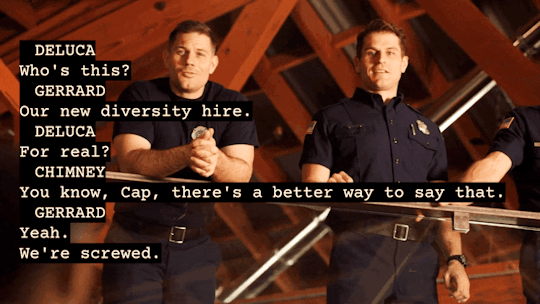

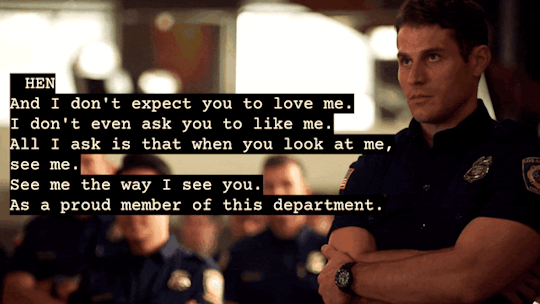




2.12 Chimney Begins - 2.09 Hen Begins - 2.16 Bobby Begins Again - 7.04 Buck, Bothered and Bewildered
Tommy's family arc
#911#911edit#911 abc#911 show#911 spoilers#911 season 7#tommy kinard#evan buckley#evan 'buck' buckley#kinley#bucktommy#kinkley#tevan#pick a ship name you guys and thanks for picking tevan the most correct name#anyway analysis time!#looking back with Modern Knowledge tm about why tommy acts the way he does in the past... babygirl you were so closeted I'm so proud#babygirl was back there getting into narnia#he was so resistant to letting go of the pseudo-family he'd found at the 118 in chimney begins#even tho it was a good old boys club that he knew he really didn't fit into he was making himself fit because at least it was something#but then he let chimney in and then hen came around and he saw a very queer person being openly queer and not giving a fuck what they think#and I think his behavior in that episode was trying to support hen as much as he could without outing himself#because like. how do you give up years of relative safety with people who do care about you they just won't like you anymore if you're *you#then he meets buck in s7 which is like 10-20 years later timeline is fake and he's like oh. this is what unconditional family is#and he's like oh. maybe I can come back. maybe I can be part of this again somehow. maybe we've both grown enough#or at the very least he'll be close to something he never believed would really happen for him#rant over tevan my beloved tim minear pillow cold both sides god bless#my edits
2K notes
·
View notes
Note
you are so whimsical i qant to check out this mdzs (..??) because of your whimsical nature thank you sorry im very high and your art moved me emotionally
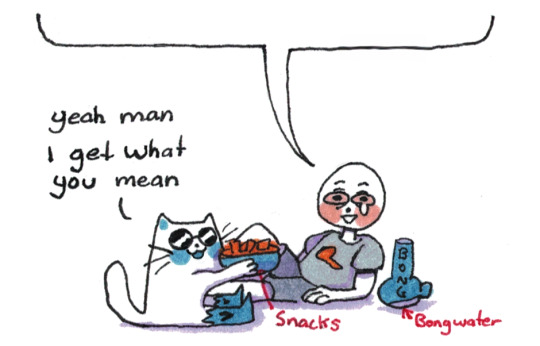
This is simultaneously the sweetest and funniest thing someone has sent me, thank you.
#ask#non-mdzs#I have a hunch you will not recall sending this to me but I wish to immortalize it.#The progression of me going 'aw' to 'barking with laughter' at the last bit of this message was a delight.#Oh man what to say about getting into MDZS...#I admit I'm probably low on the list of people who should be recommending it.#I enjoy it! But there are also a ton of different adaptations that each do a slightly different thing with the story and characters.#Personally I loved The Untamed (Netflix live action) for how campy the action was. It got emotional but really...It made me laugh.#And I love watching it with people because it also makes them laugh.#(The Untamed changes a lot of plot elements so it isn't looked upon very favourably by many fans. I love it as its own thing)#Don't get me wrong; it *is* a story with interesting things to say and I certainly have written tons of analysis on it.#But it's also a series I spent over a year making parody comics of. It comes from a place of love!#The audio drama is really good and I think it might be the best form of mdzs...however finding episodes is not easy.#The audio drama is also what I'm basing all these comics on!#There is a book (the primary source) An animated series and a comic to check out as well.#Someone probably has a better pitch and recommendation list than I do. I just make the funny comics.
285 notes
·
View notes
Text
On Kurapika's Self-Imposed Isolation
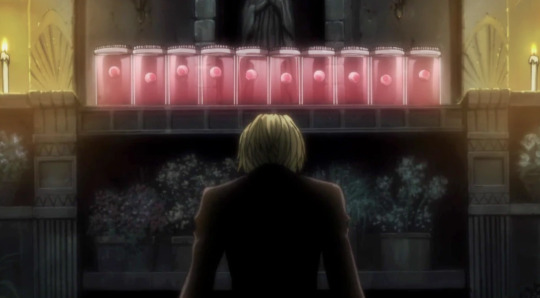
While I recognize that probably everything I'm about to say is going to be super obvious, I just wanted to briefly touch on Kurapika's self-isolation, and the reason behind his not picking up his phone or exchanging anything more than clipped words and business after Yorknew.
I think the obvious answer is that Kurapika doesn't want his friends in harms way, or to be used as a bargaining tool against him. This is an understandable and probably accurate conclusion. After all, Gon and Killua did get taken hostage, and Kurapika was forced to negotiate an exchange. Chrollo picked up on Kurapika's "weakness" right away - that he values his friends' safety before his revenge. Fortunately for Kurapika in this situation, Pakunoda was a whole lot more similar to him than he would've cared to admit, as she placed a value on Chrollo's life even though everyone in the Spider was intended to be replaceable. So, now that he's been through Gon and Killua having potentially gotten killed or seriously hurt, and Chrollo knows that he has a soft spot for them, it does make sense that he would try to push them away for their safety and for the sake of not having an exploitable "weakness" in future. He may also not want to burden them more when they have their own lives to live - he does slip off without telling Gon and Killua for the sake of not distracting them from Nen training, after all.
Except that he already tried all this earlier in Yorknew arc. He tried to tell them they shouldn't get involved, and they all agreed that the risks were massive - but his friends agreed to undergo the risks anyways to help him. Kurapika was even grateful for it - "I have been blessed with good friends."
So, for him to push them away solely for this reason after the fact, knowing that this was very much a likely situation to happen, is a little odd to me. Kurapika knows full well that Leorio would be frustrated, Killua would be offended and Gon would worry. So, I think there's a little more to it than that, and I actually would venture to say that "keeping his friends out of danger" is more a secondary reason for his actions - one that would come across as more of a reasonable excuse to others.
The primary reason is likely a lot more selfish than that. Kurapika has to ensure his mission comes first. And unfortunately, he is fully aware that his path and choice in abilities is deeply self-destructive.
Kurapika needs to make sure that he doesn't have exploitable weaknesses, sure, but he also just as much needs to purposefully worsen his headspace - and he can't do that with those three around.
Think back, what are the happiest moments we see from Kurapika in the series? The one that comes to mind first, and the one I'm sure most of us will think of immediately, is this:
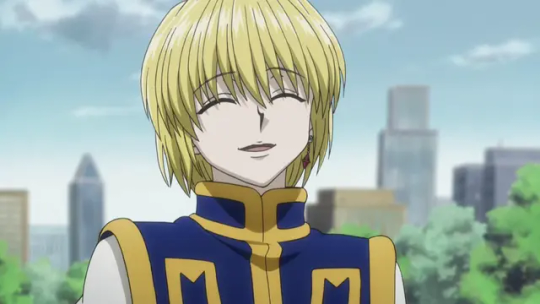
[ID: A screenshot from the 2011 anime adaptation. Kurapika smiles - he looks at ease. End ID.]
It's one of the sweetest scenes of the series imo, right before the whole group is reunited for the first time since the Zoldyck Family arc, and it's even more notable because it comes immediately on the tail end of this...

[ID: Three panels from HxH Chapter 101. Kurapika removes his contacts over the sink. His expression is distant. End ID.]
...and this...
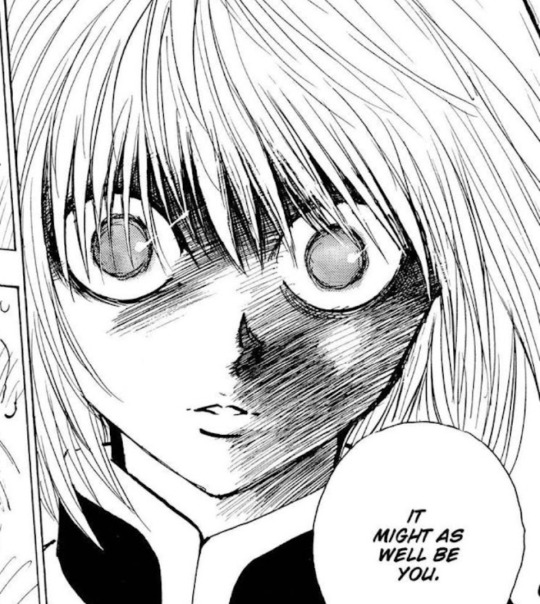
[ID: A panel from HxH Chapter 101. A close up of Kurapika's vacant and furious expression, his eyes wide and dangerous as he says "It might as well be you." Though the art is in black and white, it's apparent his eyes have gone scarlet. End ID.]
...and this.
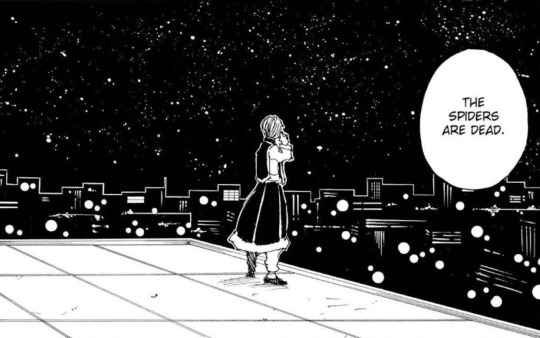
[ID: A panel from HxH Chapter 101. A distant Kurapika speaks on the phone on a rooftop at night, the cityscape of Yorknew around him dark, but speckled with lights and stars. He says "The Spiders are dead." His face is not visible to the reader. End ID.]
This is, up to this point in the series, Kurapika at his lowest. In contrast to Gon, who is happy to hear that the Spiders are dead already because now Kurapika can focus solely on finding his peoples' eyes, Kurapika... is clearly not happy - and that's because killing the Spiders himself isn't just revenge. It's penance. It's survivor's guilt. Kurapika's powers, which Izunavi even comments sound much like he is chaining himself in the process of chaining his enemies, are oh-so-beautifully prophecied to destroy him - and Kurapika was aware of this from the moment he set off down this path of revenge.
(As a side note, this is why I'm really hoping we see Gon and Kurapika interact again after the Chimera Ant arc - while Gon has always been pretty attentive to Kurapika's emotional state, in Yorknew, he lacks a true understanding of why Kurapika would go so far... but as of now, he understands rage fueled by guilt and grief all too well. I know we're all rooting for Leorio to reach Kurapika, but barring that, I really think Gon could get through to him - after all, they are similar in several ways, and I find it fairly apparent that Gon reminds Kurapika of Pairo.)
But back to the main point here - I do suspect Kurapika expects (if not wants) his revenge mission to destroy him. I think a lot of times, we forget just how young Kurapika is, and how much his character is dictated by honour, and the abandonment of it.
Certainly, he can and will go against his principles for the sake of his mission... yet, almost paradoxically, he's bound to his promise to his fallen clan; a promise to avenge them made in anger.
But Kurapika... doesn't come across as a naturally angry person to me at all.
He seems like the stoic, vengeful type on his initial introduction... and then we get his panic at Gon's recklessness
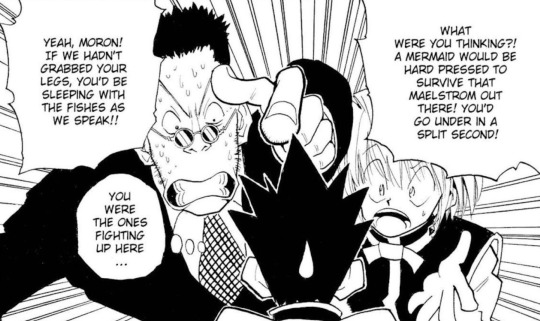
[ID: A panel from HxH Chapter 2. Kurapika and Leorio wear matching expressions of panic in front of Gon, calling him out for his recklessness. End ID.]
...and his near-immediate forgiveness of Leorio after getting the first inkling of his character - of someone who cares just as fiercely as he does.
And after that point? Almost all through the Hunter Exam? Kurapika smiles so readily at them. He's sharp and funny. He mediates at times, but is stubbornly prideful in others. He's very amused by his friends' antics, and it really does seem like he starts to enjoy himself, with them. And, more than that, he counters Leorio's initial impression of him as an independent loner - on several occasions. He decides to follow Gon because Gon intrigues him. Asides from Gon, it is Kurapika who is the most unwilling to fight each other at the bottom of Trick Tower. Kurapika who makes the first move to team up with Leorio, even though that arrangement benefits Leorio much more than it does him. Kurapika who refuses to abandon Leorio to his fate in the cave, and who checks on Gon after noticing his bad mood. Who was furious enough watching him get beat down by Hanzo that his eyes went scarlet for the first and only instance outside of Spider mentions and Emperor Time. Who quite readily detoured to help rescue Killua.
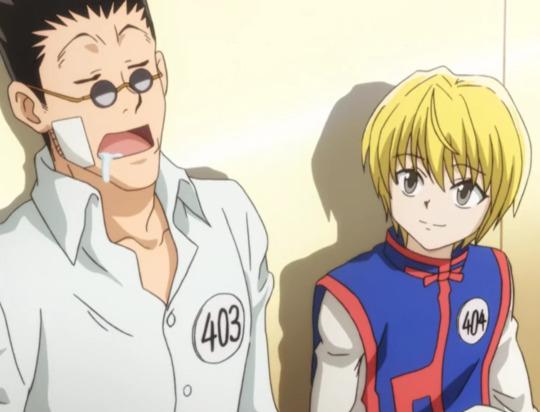
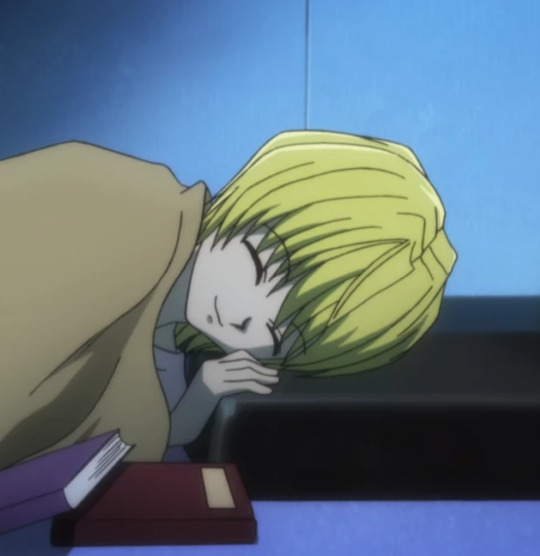
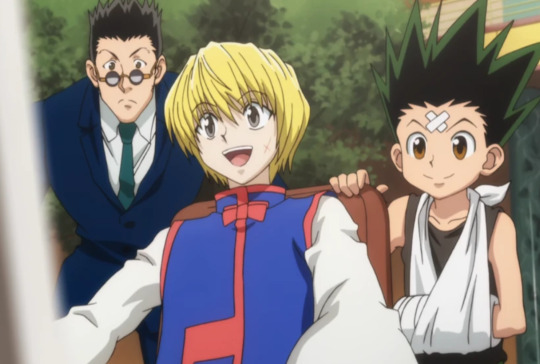
[ID: Three screenshots from the 2011 adaptation Hunter Exam arc. In the first, Kurapika smiles at a sleeping Leorio. In the second, Kurapika stifles laughter as he pretends he's asleep. In the third, Kurapika has an open-mouthed smile as he acquires the airship tickets for them, Leorio and Gon standing behind him. End ID.]
Look at him! He's so bright! So happy!
...too happy. Too happy to do what he promised himself he would do. And that's his biggest fear, isn't it. Without his rage... what is he left with?
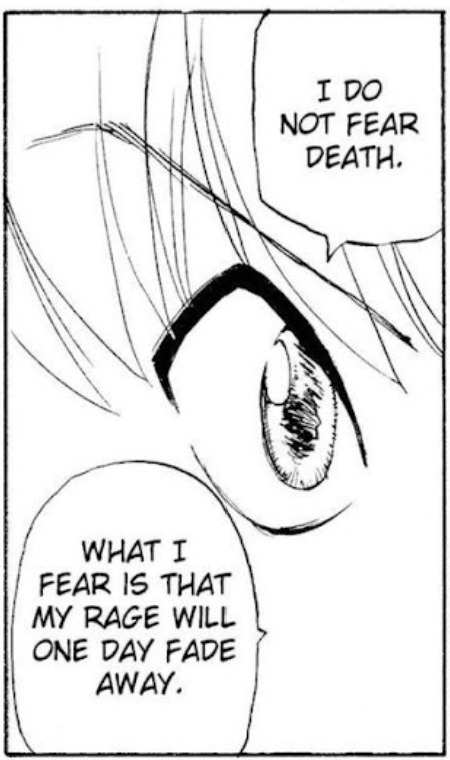
[ID: A panel from HxH chapter 2. A close up of Kurapika's eye as he says "I do not fear death. What I fear is that my rage will one day fade away." End ID.]
Kurapika is far, far less mired in anger when he's with his friends. I actually dare to say that at certain points, he was able to go for lengths of time without thinking much about it - alternating between almost forgetting in one instance and being hit like a sledgehammer on exposure to a reminder in the next. This violent swing is... actually the beginnings of the natural process of healing from loss and trauma. But to Kurapika, who's made a promise to his people's memories, this is not a relief. This is betrayal.
I think that actually scares him, that he can almost picture it. A life beyond his guilt. That he, too, could learn to be happy, even after unimaginable loss.
And so, as Kurapika continues his mission offscreen, finding more and more gruesome reminders of the cruelty inflicted on his people and losing more and more pieces of himself in the process (in his own words, no less), he prioritizes his responsibility to them, and pushes away his distractions. He cannot be a soul at peace until his work is done; he must be in turmoil. He pushes people away who he cares for, and binds himself, and keeps his people's eyes on him, quite literally, because respite, for him, is unacceptable. Perhaps that guilty part of him even hopes, by the end of this, that his soul will be so unrecognizable as to be fundamentally unsalvageable. But the truth of the matter is, or at least what comes across to me, is that Kurapika cares much more fiercely than he hates. He knows what matters most. And for as long as he does, he still hasn't truly lost himself.
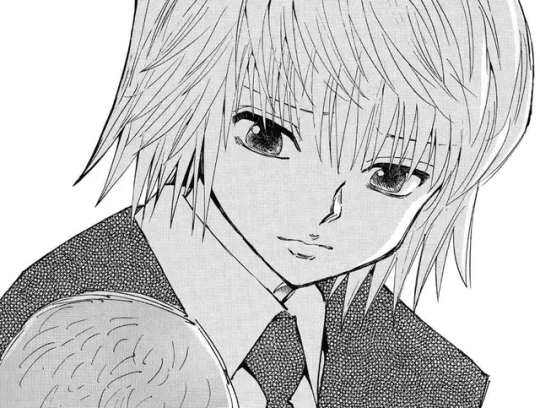
[ID: A panel from HxH chapter 350. Kurapika looks down at baby Woble with a gentle, yet complicated expression. The inking is somewhat softer. End ID.]
Kurapika's soul is kind, really. And it wants to heal - but for the sake of his mission, he needs it damaged and bleeding. And so, he forces himself to exist in that pain. All alone.
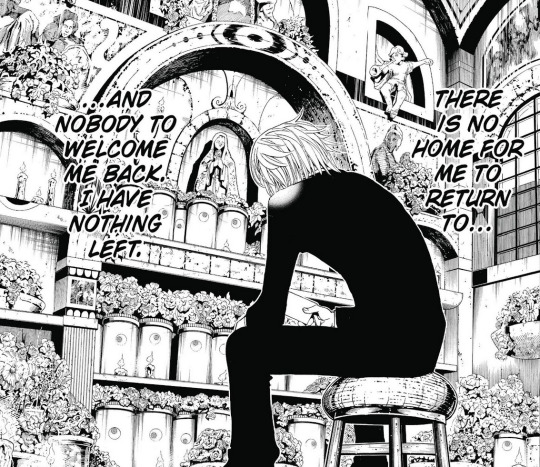
[ID: A panel from HxH Chapter 344. Kurapika, dressed in a black suit, sits with his back to the reader, looking down at a photo in his hand. He is slumped a little before the church vigil he has prepared, all his clan's eyes lined up in their jars and honoured with flowers and candles. He thinks to himself "There is no home for me to return to... and nobody to welcome me back. I have nothing left." End ID.]
#thank you for coming to my ted talk on how kurapika is worsening his own mental health as well as physical health on purpose have a good day#oh my god this took me so long but it was worth it!!!#actual analysis!!! it's been so long!!!#anyways i'm far shakier on my hxh knowledge than other fandoms i've written meta for#so i hope this makes sense. i appreciate additions to it just please be polite!#i also believe that togashi's writing lends itself to multiple interpretations that are equally valid. so much of this#may be my own takeaway. but i do think there's enough evidence to support it#well. i hope you guys suffer... i mean enjoy.#storyrambles#hunter x hunter#hxh#hxh meta#kurapika#call me ace detective the way i am ace. and also a detective#<-analysis tag i missed you
248 notes
·
View notes
Text
to summarize an unduly rambly post: our control over kris has been steadily growing more and more distressing for them throughout the story. the snowgrave route, possibly the most gut wrenching, violating imposition of our will on theirs AND Noelle's (*homer voice* so far!), explicitly, thematically, and visually represents possession and coercion through romantic imagery, specifically rings and weddings. it's nauseating. it forces both of them into an implied relationship that neither of them is comfortable in by leveraging noelle's desperate wish to reconnect with her childhood friend. it has exactly the horrible connotations you don't want it to have.
ralsei being presented as both a direct callback to asriel—both the undertale asriel we know, and y'know... kris' brother in deltarune—while also setting him and kris up in a clearly romantic context that kris does not seem to either share or be comfortable with, is not a coincidence. it's not an accident. "isn't that a little incestuous" that's the point! kris' agency being stripped away is one of deltarune's main thematic cores: the game is repeatedly setting up a pattern where that theme is reinforced by putting kris in upsetting, unwanted romantic relationships for OUR entertainment. nothing fits the bill better than pairing them with the nostalgia bait companion that literally looks like their brother.
#incest mention#I'm sorry your only experience with incest as a literary topic has been the skeleton brothers lightsaber-fighting with neon colored dicks#but it's almost like delicate & upsetting topics can be used to have thematically relevant and also upsetting narrative functions#yes! on YOUR computer! it's more likely than you think#not all media is meant to be escapism not all media is made to make you feel good#certainly not one that calls the player's actions and presence into question like DR#deltarune#kris#noelle#ralsei#yeah I'm tagging this one it's just straight up good analysis#entry log#metanalysis
393 notes
·
View notes
Text
Alright, I'm about to have a Trolls moment. Please ignore me if you will.
So I'm starting to have a meltdown over Branch's brothers' understanding of who he is as a person.
Like, they were fully absent during his entire childhood and young adulthood, of course. And we all keep making jokes about how they didn't tease him enough about his relationship because, duh, that's what brothers do. But what I have yet to see discussed is his confidence as an individual, how he interacts with the audience as a band member, and how his brothers are simply not interacting with a person they've ever met before.
Like, there's the whole "boy band members are so suave so as to properly appeal to their audience" thing, and Branch, post-World Tour, has gained a lot of confidence. Yes, most of his audience interaction is aimed at the band's biggest fan, his own girlfriend, but he does so very smoothly. The level of confidence that Branch has gained since the first movie is immense and it's actually so heartwarming to watch the two movies back-to-back to see, but beyond that, his interactions with Poppy, as her boyfriend and also as a band member, are very confident, flirtatious, and charming. He's playing up the persona when he's on stage of course, but they also flirt a lot on their own as seen in this movie. And while yes, his brothers being his brothers would probably off-screen tease him about flirting with his girlfriend, they also have no idea how he is as a band member. Because the last time they were in a band together, Branch was IN DIAPERS. Spruce was the Heartthrob, the flirt, the tease, and Branch was a BABY. But now Bruce is married, he's checked out of that life. And even if it's all directed at Poppy because Branch is a very loyal boy (clearly), he still has never exhibited those specific behaviors in front of his brothers. It's funny and easy to make fun of when it's with his girlfriend, but when he does it as a band member? Then it's a persona. And he's absolutely killing the game.
The boys have never met this suave, confident adult. They've never seen Band Member Branch with his own personality, with character traits, with the ability to make decisions for himself in any form. So his new band persona is, apparently, to some extent, the flirt. And his brothers must be reeling from that, because WHO is this guy??
I don't have a point. My point is just the idea that once upon a time, when Branch was in the band originally, he was just Some Kid™. And now he's not just some kid, he is A Boy Band Member™. And kind of the new leader, to boot. Beyond that, to Poppy, he was just Some Depressed Guy™ for so long. And once again, look at him now. The character development combined with character perception is just so absolutely fascinating to me and the lack of time to elaborate on it is very much the reason why fanfiction exists.
I don't know, man. Big Trolls fan over here. I love Branch so much.
#I don't even know what to say#I'm just so obsessed with how he's become characterized throughout the franchise#It's been such a slow natural character development too#I sincerely want this series to go on for a long time#2043 I want to see Trolls 8 in theaters#Like please it's so good#Please hire me DreamWorks I'm begging you#Trolls#Trolls 2#Trolls 3#Trolls World Tour#Trolls Band Together#Branch#Poppy#Broppy#Brozone#Poppy and Branch#Analysis#DreamWorks#Mine
383 notes
·
View notes
Text
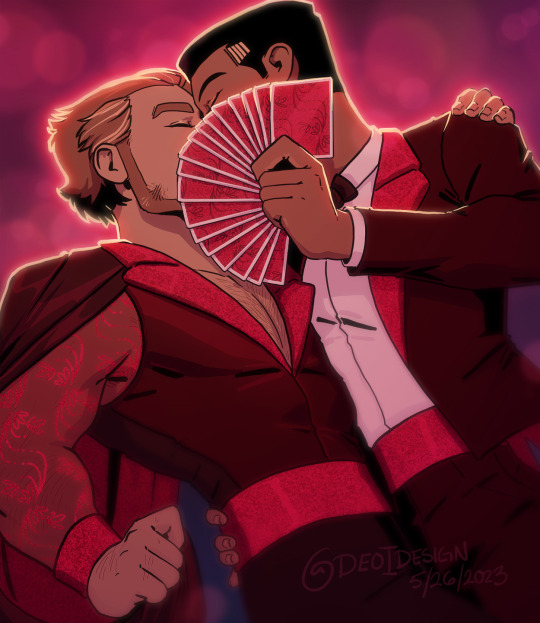
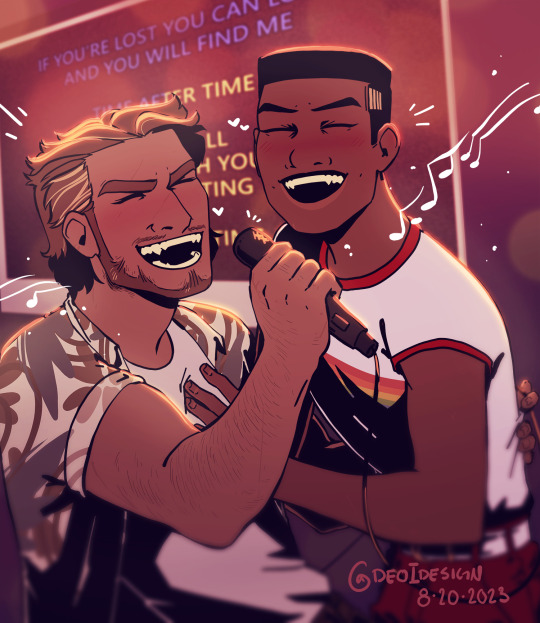
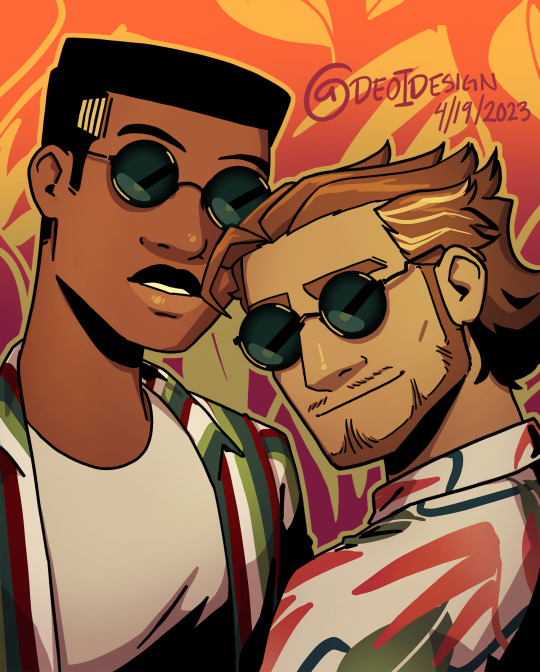
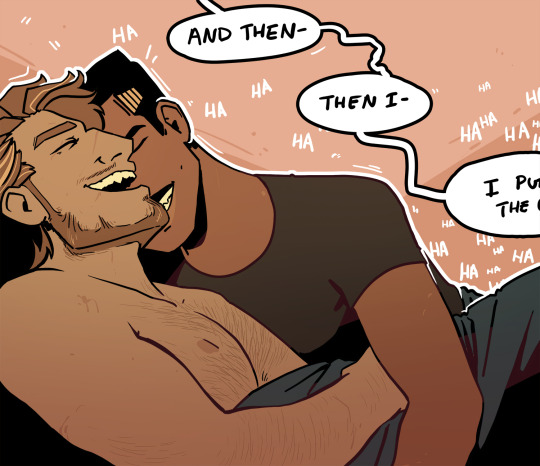
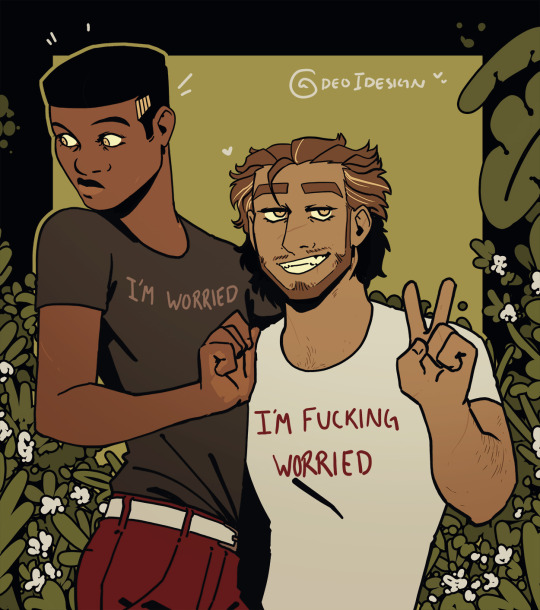
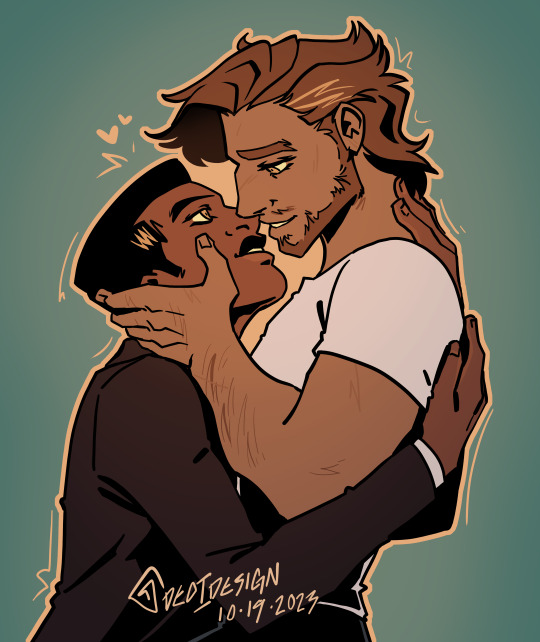
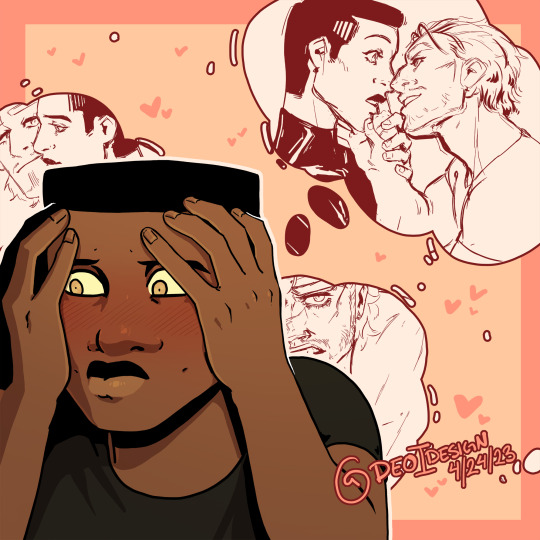
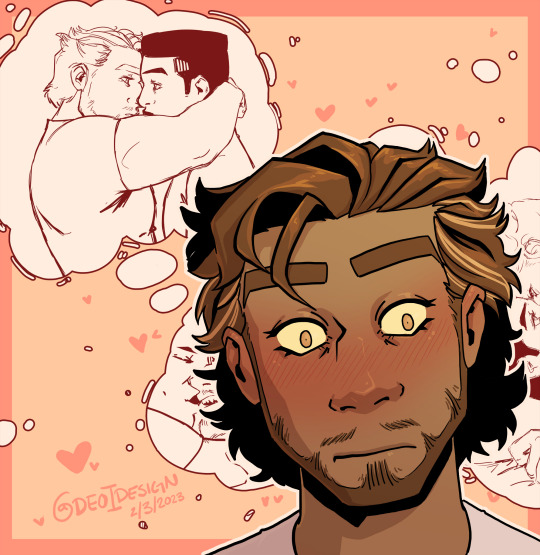
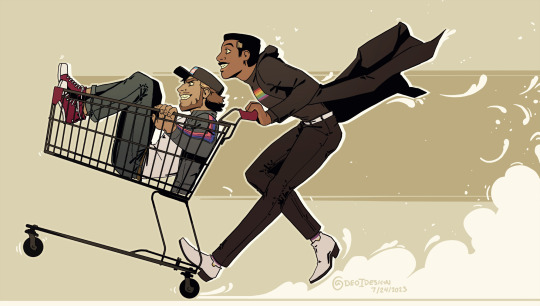
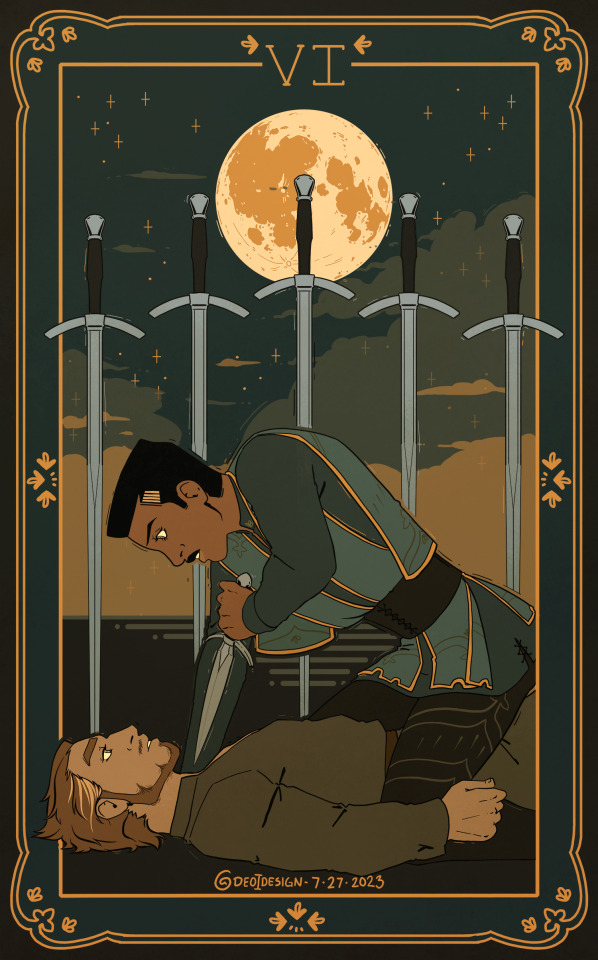
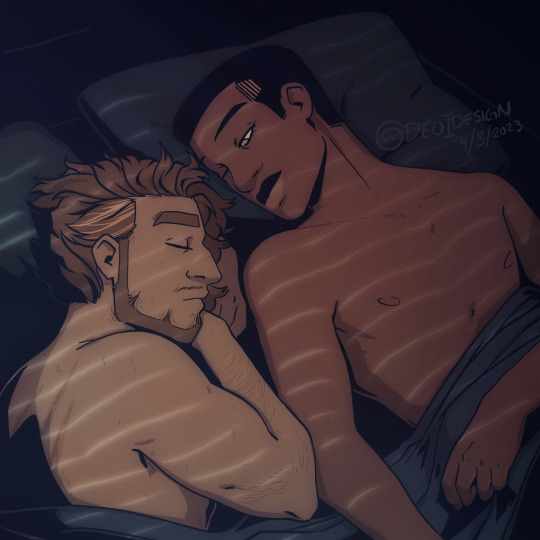
I have freaking silly little guy disease...
After a full day of work (drawing them) I relax and draw for fun (drawing them)
ON GOD I am going to create and fuel my own fandom. If every post in the tag is mine so be it but it will not be empty. drink from my cup.
Such a big fan I'm making their whole comic and then some
#like yknow what.#it's fine if other people arent doing analysis#or making art#or. idk making shitposts HAHA like#I'm having a freaking good time#I love them#my only fear is like#that people see me making stuff#and theyre like oh I dont have to#or god forbid#I SHOULDNT#like I'd be so so so worried someone would... idk it's silly#but I'm worried someone might see me making stuff and then worry that there's a way to make stuff wrong#there isnt!!! I promise!!!#I promise you can't do it wrong you can make aus you can make fan ocs you can do whatever!#its okay!!!#I just make a ton of stuff because I LOVE them#and I can't help it#theyre straight up my whole life#sorry to all my friends#I dont have much to talk about#other than the them
191 notes
·
View notes
Text
[A sad violin song plays over an image of a sad hamster]
Pac: This doesn't have anything to do with me – I wear a blue sweatshirt, you're crazy, this mouse doesn't even have a sweatshirt, this hamster! [Reading chat] Am I a depressed hamster?
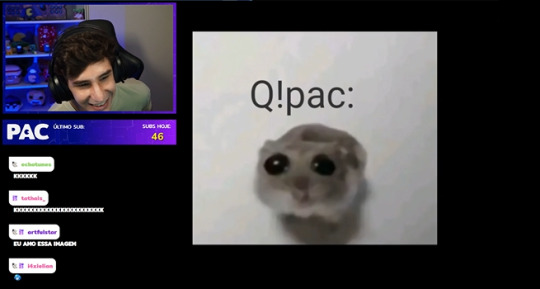
[ Transcript continued ↓ ]*
–
Pac: Actually– that's fine! I embrace that idea – of course I'm going to be depressed, are you crazy? [He hits his desk, then starts counting off people on his fingers] Fit is gone, Richarlyson is gone, Ramon is gone, Bagi and Empanada who were always there when we were there are also gone, I haven't seen them! It's just me and Tubbo, and sometimes Philza shows up.
Pac: I lost Chume Labs, I lost the Favela, I lost Murder Mystery, I lost Ilha Chume Labs, it's crazy! Look at how much I've lost, and I've gained nothing! Of course I'm going to be depressed, are you crazy?! How am I supposed to be happy?!
Pac: [Reading chat] "You have us Pac," that's true, thank you. No, that's true, sorry.
* NOTE: Please note that this is an incomplete transcript, as I was primarily relying on Aypierre's translation mod at the time and if I am not confident of the translation, I do not include it. As always, please feel free to add on translations or message me corrections.
#Pactw#QSMP#Pac#March 18 2024#As much as I love keeping people updated about Pac / the other Portuguese-speaking creators#I think I might not make as many transcribed posts for their clips anymore#I just don't think I'm qualified enough to be transcribing things for a language I don't know#like yeah we have the Qlobal Translator and Aypierre's translators to rely on#And I'm always upfront when I'm not 100% sure about a translation#but I've been thinking about it a lot and it kinda makes me feel a bit icky. Idk.#I might be overthinking this but I just I don't want to spread around translations I'm not super confident about#esp. since I know a lot of people cite my clips in analysis posts or link them to other people as resources#and 90% of the time I'm like ''Hell yeah I love seeing people getting a lot of use out of the archive''#but sometimes I get a bit anxious like ''Did I do a good enough job translating this''#''Am I ruining someone's entire perception of a conversation or character because I left one word out or mistranslated something?''#And like I said that's normally not a HUGE concern since if I'm not certain about a translation I just won't post a clip. but you know#idk it might just be the anxiety talking but I really really don't want to spread bad info#Happy to hear other folks' perspective#I'm really grateful for people like Bell and Pix and others who translate clips and I always try to reblog those#but we don't have a ton of people posting clips & translating things on Tumblr since we're so English-centric#which is part of the reason WHY I like sharing clips of the non-English-speaking CCs#but at the same time I want to do an accurate job representing what they're saying#Maybe I'll just start posting things and give a TLDR context of what they're talking about but not a transcript#that way native-speakers can hop in and add translations if that's something they're comfortable doing#and if not then well. at least I'm not sharing something that isn't super accurate#idk I'm just thinking out loud a bit in the tags#But I'm open to hearing other people's thoughts on the matter#Anyways giant rant aside. q!Pac is NOT doing ok rn
252 notes
·
View notes
Text
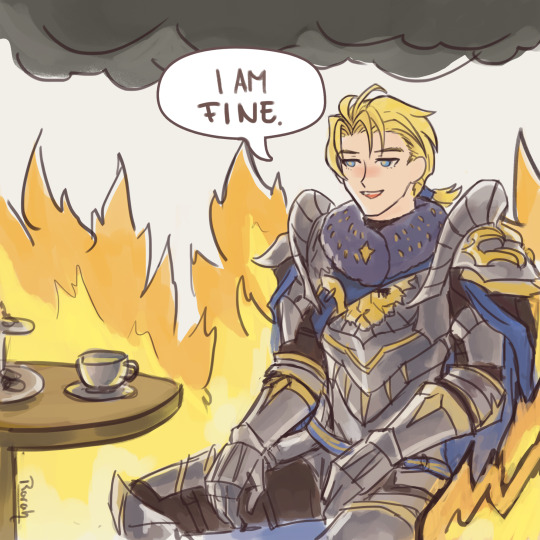
The mentally stable Dimitri Fire emblem 3 hopes.
It surprises me that there's still ppl claiming so, but then I remember we're talking about 3h interpretations and I have to make peace with it.
But that doesn't stop me from venting a little bit in this little space I have lol. Actually, it dries me and makes me feel bad to bring this up because I will have to talk bad about Dedue, and I don't want to talk Bad about Dedue. He's a genuinely good boy. But "Human" nonetheless, which means Flaws.
I like Felix too but he's become some sort of a clown that doesn't make me feel too bad. I like Felix tho, In a different way.
Mostly talking about these two because the take that "Dimitri has better support system" baffles me because, technically, these two are his support system in HopesVerse. The persons who Dimitri relays on and seek solace/advice/support. The rest doesn't really tackle any of his personal struggles (aside from the Mage!Mitri frustrated dream, but that's out of the bad equation in our 'mentally unwell' set of pixels, and Shez only has a glimpse). Contrary, to Houses verse where the whole blue lions cast knew about his shit, didn't know what to do, but didn't leave either.
I tackled this topic with other person on Twitter who was (or still is) on board with this take and the phrase they used was They contained him better, which of course I agree and remarked that was exactly the problem.
Contain him is gonna be contra productive. I used a water dam analogy, where the structure of such dam is damaged, and the pressure of water keeps accumulating. Causing a foreseeable damage for the dam itself and the surroundings. You don't need to be a genius to understand it, you need experience or knowledge for mental ill topics tho.
I really don't want to extend so much on here because it's mostly just, rant format more than a proper analysis so I just want to point out these two things in their support conversations.
First, Dedue.
Encourage him to keep on the vengeful path. Which we know was the final goal of Azure Moon and if you payed attention to 3 houses message. The whole Vengeful argument was something Bad, to keep it simple.
Despite Dimitri actively looking for answers/guidance for something that, in a rational state he can see clearly like vengeance will consume his life (also Shez and Felix called out this behavior). Dedue answer only encourage him to keep on that path, because he would do that 💔. Presenting 2 oposite views is a great formula for confusion and disorientation.
Now, Dedue's role is primary SUPPORT, not guidance nor orientation. He will support his shit no matter what, and we are quite aware of that if played Houses.
Second, Felix.
Felix is a special case. He is smart but also an idiot lacks A LOT of soft skills to actually be of help.
He's the only one who knows in this verse about Dimitri having a mental issue. In their A support to say the least, so they don't close or solve anything. What makes it more worrisome is the fact that Felix conceals the issue as a secret.
"So try to keep that whole "removing their heads" thing in check, yeah? We can just call it our little secret."
this extract here makes me feel so unwell 😭help
The whole burden falls over him and his lack of skills and wisdom on the matter will be too much for him later on. He at least, will be able to recognize that the problem is beyond of his capabilities and will look for help. Felix himself has his own issues and journey where he needs to learn. He's forced to get pass beyond some of his angry teen behavior but hasn't completely get over it.
There is a lot more to tackle, but that requires more work and time.
What are the topics some of you think is important to cover around understanding the Hopes verse resolution?
Dimitri's route? something?
Do you think the route without Byleth is better?
With that being said, I would like to delve deeper into character analysis, and the role each played for the Lords too. That also requires to talk about the Byleth and needs a whole analysis on their own, which requires time (which i don't have much lol)
To end this vent, I would like to encourage people to do a little research for the terminology they're using like "Support System". Who makes it up and how it operates successfully.
The fact that ppl saying "he has better support system" only because he didn't go feral on the run alone is not entirely valid. A reminder that people can feel alone with or without people around them. And containing the issue within doesn't solve any problem. At best, it's presented later. At worse, it gets worse.
#dimitri alexandre blaiddyd#my lil blorbo with mental health issues#few3hopes#fire emblem warriors 3 hopes#Today I woke up and felt like venting#BUT Just to make myself clear#this has nothing to do with ships#you can ship whatever you want#You do you#Just in case someone has that feeling#This is an analysis from a mental health point of view#because it is one of the strong points of this character and with which many of us connect/relate#So I like to apply psychological and neurological (even psychiatric if necessary) perspectives#And I like to apply realistic theories to this fictional world because that is the good thing about three-dimensional characters#They feel so human that all these hypotheses can be applied#If some of you don't. That's cool too. You do you#Enjoy the game as you please lil fella#ALSO ALSO I'm taking into account what the intention of the developers was#(that would be tricky considering the inconsistency withing the developers' team >___>)
197 notes
·
View notes
Text
I find it so SO interesting that as soon as Kazui's breaking their marriage vows and revealing his true feelings (literally tearing apart the dove), the wife is already falling off the balcony
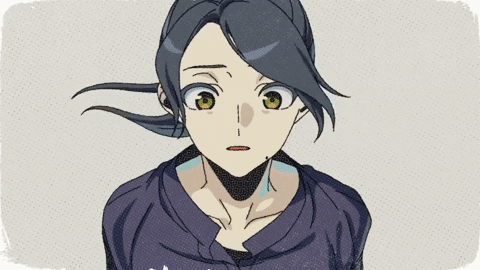
Her hair is fluttering in the wind. The apple fucking splatters on the ground this whole sequence is so visceral I'm spinning it around in my mind. Kazui views his truth telling as a violent act, the killing blow.
#milgram#capri talks#kazui mukuhara#Cat#I made a gif for this are you happy (I love this part way too much I would've made it anyway)#I have... thoughts about this which Scare me but. For now... I am going to assume in good faith that this must be taken figuratively and#symbolically because that's the most obvious interpretation right. right guys??? *one fear*#*looks at the voice drama which starts with how he's never gone up against a woman as strong as him until kotoko*#*looks at the line 'it’s generally the heavier person who ends up winning.'*#*looks at that one frame in Cat at 2:33 where he's holding her back*#DONT MIND ME IM JUST DELIBERATING I want him to be innocent I want things to be simple but I'm so worried of being hoodwinked--#--when the guy literally emphasises sleight of hand tricks and magicians and disappearing acts in his MV :'D#when he literally has a 'son of man' painting reference (man w/apple in front of face)#I am going to stop talking or else I shall combust into a million pieces#analysis#described
583 notes
·
View notes
Text
I’m not much of a shipper, especially compared to other people on tumblr, so let me tell you I saw the gif set of the scene with Hugh Grant before I saw Glass Onion, just vaguely skimmed it and went “oh? he’s playing a gay husband? how nice, OH this is from Glass Onion? That’s Blanc’s husband? Fucking Neat gotta watch this soon now don’t look at the gifs too hard so I don’t get spoiled any further”
so I am terribly sorry but I gotta say, people’s reaction being “I thought that was his butler” has me like ????? You thought. That was. his BUTLER? You saw a frazzled looking man in a t-shirt and tie-die apron holding a sour dough starter in the may of 2020 scolding another man for being in the bathtub too long and went “this seems like an emploer employee relationship”? If that had been a fictional english butler Jeeves’ ghost himself would have jumped out from the pages of a Best Of P H Woodehouse collection and politely tossed him out of a window WHAT ARE YOU TALKING ABOUT YOU THOUGHT THAT WAS HIS BUTLER why would someone’s BUTLER complain to ANgela LANSBURY about his boss not leaving the bathtub Where did you get that idea from he wasn’t dressed as a butler he didn’t talk like one There are Movie Conventions that will tell you if someone is a butler Hugh Grant telegraphed None of them
what you did there was you gal palled them, you looked at two queer people and went against all evidence for the straightest explanation. “Well why didn’t we see them kiss and stuff” Because they didn’t have to they really didn’t. There is No Fat in that script it’s Yes he’s in a relationship let’s move on. We didn’t even get to see Helen’s makeover! Frankly I had assumed that Blanc is just living alone like so many famous fictional detectives do, Sherlock Homes has his famous flatmate but that’s as far as it usually goes, Columbo has a awife but we never even get to see her, the fact that they just gave Benoit Blanc a spouse and we got to see him in the second installation of the franchise on screen was enough of a shock for me to take in if they had shown us any more domestic stuff I would have dropped dead on the spot
#Glass Onion#you all are so good at media analysis why are you also so bad at it#this is 'Xena and Gabrielle is gay subtext I wish it was canon' all over again THEY KISSED YOU IDIOT THEY GOT MARRIED IN THE FUTURE#I will throw a shoe at someone Oh My God#I'm having an anoyrism or something#anyways watch Glass Onion it's a banger 10/10
1K notes
·
View notes
Note
So, I'm writing an essay on the whole STATE of misogyny in WC for one of my university classes, and I was wondering if I could ask you a couple of things! No pressure of course, please feel free to say no!
A) Could I reference your good takes with appropriate harvard referencing and links back to your blog?
B) Are there any specific moments from the books that you think should be covered the most?
C) The end result will be a visual essay, so it's like those fun infographics people on Tumblr make on like ADHD and stuff, so when it's done, would you like to be tagged to read it?
(Sorry for anon, I'm nervous lmao, but if you'd be more comfortable I'll resend this off anon)
AAY good topic! You've got a lot to work with. Absolutely feel free to reference anything I've written, and tag me when you're done.
While you're here and about to write something so legitimate, I'm also going to recommend you check out Sunnyfall's video on gender in Warrior Cats. She breaks down the arcs into numbers, directly comparing the amount of lines mollies have to toms, and examining the archetypes women are usually allowed to be.
I think it's a must-have citation in a paper about WC misogyny.
...and, I think it's insightful to look at the WCRP Forum thread about the video. Note how the respondents immediately come into the thread to complain about how the video is too long so they didn't watch it, dismissing Sunnyfall as not being entertaining enough to hold their attention, even whining that she starts with statistics to prove her point, which I'm convinced she did exactly because they would have cried that she "had no evidence" if she didn't.
I am not a scholar, so I don't know how to document or prove that the books have an impact on the audience outside of anecdotes. But I think if you do write a section about fandom, it would be worth mentioning the in-universe and metatextual apologia for Ashfur and its reflection in the real world discourse, the authorial killing of Ferncloud because of fan complains, and the utter defensiveness against the discussion of misogyny you see outside of Tumblr.
You may also want to check out Cheek by Jowl, a collection of 8 essays about sexism in xenofiction by Ursula K. Le Guin. There's a very unique manifestation of authorial bias in animal fiction, having a lot to do with how the author views "the natural world," and it's worth understanding even though Warrior Cats are so heavily anthropomorphized.
So... Warrior Cats Misogyny
I think discussing individual instances can be helpful, but I'd implore you to keep in mind what's REALLY bad about WC's misogyny is framing and the bigger picture.
Bumble's death is shocking and insulting, but it's not just that she died. It's that the POV Gray Wing sees her as a fat, useless bitch who took his mate so she deserves to be dragged back to a domestic abuser, and he's right because the writers love him so much. It's that Bumble's torture and killing only factors into how it's going to hurt a man's reputation.
It's how Clear Sky hitting, emotionally manipulating, or killing the following women,
Bright Stream (pressured into leaving her home and family)
Storm (controlled her movements and yelled at her in public)
Misty (killed for land, children stolen)
Bumble (beaten unconscious, blamed nonsensically on a fox)
Alder (child abuse, hit when she refused to attack her brother)
Falling Feather (scratched on the face, subjected to public abuse and humiliation)
Tall Shadow (thrown into murderous crowd, attacked on-sight in heaven)
Rainswept Flower ("blacked out" in anger and murdered in cold blood)
Moth Flight (scratched on the face for saying denying medical treatment is mean, taken hostage in retaliation against mother for the death of his own child, which he caused)
Willow Tail (eyes gouged out for "stirring up trouble")
Is seen as totally understandable, forgivable, or not even questioned at all, when killing Gray Wing in an act of rage would have been "one step too far" with the ridiculous Star Line.
"Kill me and live with the memory, and then let the stars know it would only matter if a single one of your murder victims was a man."
It's the way that fathers who physically abuse their kids out of their ego (Clear Sky, Sandgorse, Crowfeather) aren't treated anywhere near the same level of narrative disgust and revulsion the series has for "bad moms", even if they're displaying symptoms of a post-partum mood disorder (depression, anxiety, and rage), an umbrella of mental illnesses 20% of all new mothers experience but are heavily stigmatized with (Sparkpelt, Palebird, Lizardstripe).
It's Crookedstar's Promise giving him two evil maternal figures in a single book, while bending over backwards to make every man in a position of power still look likeable in spite of the fact they're enabling Rainflower's abuse. Leader Hailstar is soso sorry that he has to change Stormkit's name for some reason, in spite of leaders being unaccountable dictators the other 99% of the time, and Deputy Shellheart functionally does nothing to stop his own son from being abused or even do much parenting before or after the fact.
It's the way men's parental struggles are seen sympathetically, and they don't have to "pay for it" like their female counterparts (Crookedstar's PPD vs Sparkpelt's PPD, how Daisy and Cinders are held responsible for Smoky and Whisper being deadbeats, Yellowfang's endless guilt for killing her son vs Onestar's purpose in life to kill his own), even to the point where a father doesn't have to have raised their kids at all to have a magical innate emotional connection to them (Tree's father Root, Tom the Wifebeater, Tigerstar and Hawkfrost).
It's less speaking lines and agency for female characters, being reduced to accessories in the lives of their mates and babies, women getting less diversity in their personalities, with even major ex-POV characters eventually becoming "sweet mom" tropes.
You could zoom in on any one of these examples and have an amoeba try to argue with you that "Oh THIS makes sense because X" or "Ah well my headcanon perfectly explains this thing" or "MY mother/girlfriend was abusive/toxic/neglectful and I've decided that you are personally attacking ME by having issues with how a character was written or utilized," but the beleaguered point,
That I keep trying to hammer in, over and over, across books worth of posts,
Is that these are trends. More than just a couple one-off examples. It's the fabric that has been woven over years, showing a lack of interest in, or even active prejudice of, women on behalf of the writers.
LONG STANDING trends, which have only gotten worse as the series progressed. From Yellowfang being harshly punished with a born evil son who ruins her life in TPB and the mistreatment of Squirrelpaw that begins in TNP, all the way up to the 7 Fridgenings of DOTC and Sparkpelt's PPD being a major character motivator for her son Nightheart.
So, I would stress that in your paper, and structure it less as "the Sparkpelt slide" and "the Yellowfang slide," and more as "The paternal vs maternal abuse" slide, and "the violence against women" slide. They're really big issues, there's tons of examples for each individual thing.
Anyway to leave off on a funny, look at this scene in Darkest Hour that I find unreasonably hilarious,
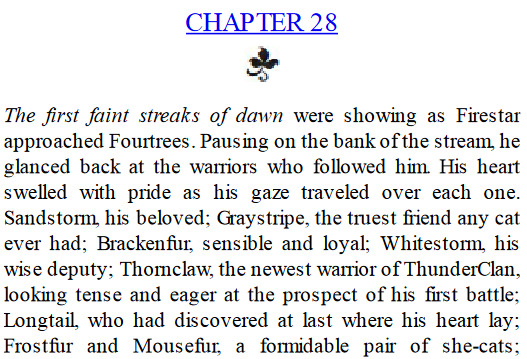
"Everyone who matters to me; my truest friend, my sensible and loyal warrior, the wisest deputy I've ever known, and 2 women." -Firestar, glorious idiot
He can't even think of a single trait for either of them what the hell does "formidable pair" mean lmaooo, when I finished a reread about a year ago this line killed me on impact.
#bone babble#cw misogyny#warrior cats analysis#SO good luck!! Absolutely ping me when you're done I wanna see lmao#Full disclosure I'm bad at responding to DMs because I open them and then forget#But I can try to answer your questions#Feel free to send questions in tho. You don't have to come off anon if you don't want i don't mind#I cannot stress enough. I'm just a guy who likes to yell about cats.
246 notes
·
View notes
Text
The Marvels is being scathed by critics, and that's a good thing.
I finally saw The Marvels today. I'm a bit late to the party, so all I saw about the movie was the teaser at the end of Ms Marvel, and way too many critical reviews of it.
Now, obviously on Tumblr you find the good reviews, like, the cats outnumbering the white men and how Kamala Khan is, like, basically all of us. But in person, I've had someone tell me that it's bad because Rotten Tomatoes rates it 43%, which-- besides wondering why anyone would listen to Rotten Tomatoes, I'd have to wonder why the website would give it such a low rating. The easy answer is that the Tomatoes review committee is populated by white men, who, upon having no one to relate to, react badly to the movie. But I think there's more to it.
The Marvels is a revolution. Through its character-driven writing and brazen exploration of morality, it rewrites the superhero formula completely, by questioning what exactly it means to be a superhero.
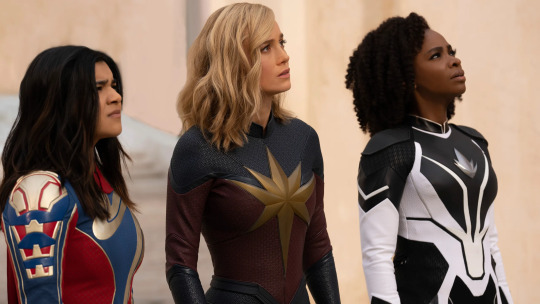
The Marvels was directed by Nia DaCosta, an award-winning Harlem native and creative visionary whose approach to this film was to define these characters as humans, not as superheroes. Her approach to heroism directly addresses that the idea that a hero is not always right. A hero, DaCosta claims, is "someone who's trying their best with the information and tools they have at the time. They'll always get it wrong." Carol Danvers's arc directly addresses this, as the resolution of her subplot involves her re-igniting the sun that she snuffed out. Her heroic act is to undo the damage that she wrought.

When compared to old Marvel, this message just doesn't come through. In WandaVision, Wanda's grief is for a family that was killed by the Avengers. Yet, she is painted as a villain, even as she searches for a happy home, even as she at one point joins the Avengers. The Avengers cannot undo what they did, and don't really try. They defeat the big bad, sacrifice their lives, but nothing brings back Wanda's family. Nothing undoes that war. No one searches for Wanda after the event, to try to help her with her grief, except for Monica, and she's working against orders. Their heroics are militant, but while they excel at destruction, they leave the people they hurt in the dust.
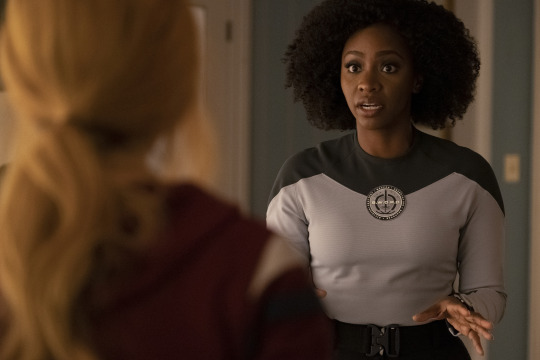
This antiheroic plot of old Marvel is precisely what appealed to so many American audiences. Their protagonists are: a rich corporation, a super-soldier, a privileged teenager, a scientist who makes weapons, an ex-convict, a man born into godlike power, and I'm sure there are others but I don't actually care that much... (these would be iron man, captain america, peter parker spiderman, hulk, antman, thor, and etc). All these archetypes appeal to American ideals that the wealthy would sympathize with. They claim that there are people who are inherently bad and seek the power that they have, in the way that a poor person might want a job that a wealthy person wants their child to secure. They claim that it is their business to save those which cannot save themselves, and use this to get involved in wars that are not theirs, and beat up badguys whose backstory they have no way of knowing-- and they punch before they stop and listen.
They are cops in every sense of the word. The responsibility of the vigilante is to defend against evil, but part of that responsibility is to figure out who exactly is evil and who is in need of help.
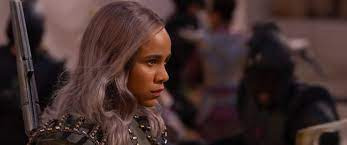
The Marvels creates a team that tries to distinguish evil from good, and delves into the grey area between them. The final battle between Carol Danvers and Dar-benn has the superhero pinning the grey-haired antagonist to the ground as she begs for, then demands, that Carol fix what she damaged. Monica urges her to listen. Through this, The Marvels argues that a hero does not always beat up the bad guy and fight against unrelenting evil, but that a hero can be wrong, and that a hero can reconsider. It's kindness in the way that is revolutionary, where it's much easier to choose cruelty.
The fact that the movie is getting torn apart by critics, then, is not just because it is a "girls movie" or it doesn't have a strong white man for the white male viewer to sympathize with. The Marvels cannot appeal to Marvel fans because it rewrites the genre itself. It takes a film series whose purpose was to depict the struggles of cops, of the wealthy, of people with too much power who are trying to learn how to responsibly wield it, but don't. And it gives that power to people who have watched superheroes try and fail, who are slowly learning to be better heroes than the ones before them.
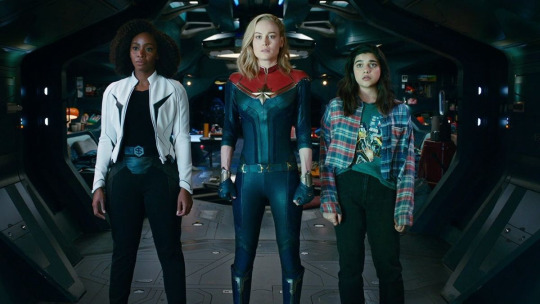
The next generation is a critique of the last, a group trying not to make the mistakes of the chosen ones that came before them, and as such, the movie exists to critique the movies that came before it. Therefore, a viewer of Marvel who would positively review it, due to sympathizing with the previous heroes and enjoying the power fantasy, would dislike it out of its existence being critical and contradictory to the films they like themselves.
The Marvels is not for Marvel fans-- at least, not those who saw the Avengers as purely heroes. Instead, the film reaches out to people who would have been against the old Avengers, who want a story that dismantles the unquestioned idealism of superheroes and writes about people trying to protect their communities and the people they care about.
So, let the critics complain. The MCU is shedding its roots as a pro-cop and pro-colonialism power fantasy, and evolving into an exploration of what it means to be a true hero.
#the marvels#ms marvel#captain marvel#photon#kamala khan#monica rambeau#carol danvers#.pyro#pyro.txt#the marvels analysis#can you tell that i loved this movie#it's been so long since i've done an analysis but this one SPOKE to me#anyways i'm coming from the perspective of a marvel hater until i watched ms marvel#honestly i just put the images in there to break it up. they are not very relevant. i didn't pirate so i don't have good screenshots
301 notes
·
View notes
Text
I've seen people saying that this season marks a transition from serious with silly elements to silly with serious elements (particularly after the 1st 2 eps) but now that we've had a lot more of the season, I think this is wrong. This season isn't silly with serious elements, it's a serious season wearing the mask of a silly season.
Spoilers under cut
Space Babies looks like it's just "lol babies running space station, lol snot monster, lol farting space ship" at face value, but there's a lot more to unpack from how The Doctor relates the Bogeyman and being the only one of his kind to the underlying themes of abortion legislation and honestly a lot more to unpack than I don't have the brain power to write rn.
Devil's Chord keeps the silly tone, but destroys the world and does some important foreshadowing about Ruby and The One Who Waits. This is the one that leans most into the silliness, but it has the stakes to work with this analysis.
The plot of Boom is "The Doctor steps on a glowy land mine" which is a hilarious sentence and the next time preview for it was absolutely left us with a lot of questions pertaining to how that was going to be a full episode, but it ended up being a thesis on how organised religion, capitalism and war are some of greatest threats to humanity and they all make each other worse. Boom is played straight for pretty much the whole episode, but it looks like a pretty silly premise before you watch it.
The 73 Yards next time preview, whilst creepy, made the episode look a lot cheesier than it ended up being and they ran with this until the reveal that the pub goers were just messing with Ruby, after which we don't get any more stuff like uncomfortable close ups or characters expositing about local folk lore. The horror b-movie is a lie.
And now Dot and Bubble. The brightest episode of the season has the darkest ending so far. At first glance it certainly looks a lot sillier than it is with its bug-eyed monsters and "phone bad" aesthetic. This episode is all about deception. Ricky lies about the home world, Lindy lies about Ricky being alive, but there's more. The residents of Fine Time get the lie of Fine Time. The whole thing is about them looking past a vale to see what's really going on around them. The Doctor and Ruby get the lie that they will save these people. They go in, they try to help and the get cooperation for a bit, but the rich kids' pride and prejudice stops them. We as the audience receive the lie that these characters could be saved in the first place. The episode sets itself up to have a hopeful ending where the rich kids start learning to improve themselves as people in a new home that the Doctor brought them to. We get so focused on that narrative structure that we don't step back and look at the bigger picture. These people think they're so amazing because they don't waste resources with their consumerism and they have followers and they're stuck in a n environment that affirms their egos yet they can't even walk without their bubbles and they mostly get annoyed when the disappearances get brought up. Their egos are so overinflated and they're so used to being in an environment where they can only talk to other people who think and act like them, of course they're not going with the Doctor. They'll use him as long as they think they need him but they refuse to accept that they can't do anything by themselves if they're not in absolute immediate danger because they think they're so amazing. This feels like it should have a somber ending where we mourn the losses and look to a brighter future in the moment because of the tone and structure, but take a step back from it and there was no other way it was going to end.
This whole season has been a tonal lie that's been breaking down as we go and I really hope they do something cool with that idea.
#dr who#doctor who#dr who spoilers#doctor who spoilers#Maybe I'm just tired#but I feel good about this#This could possibly fit into the trapped in a tv show theory#or many other theories tbf#idk I just like doing analysis I'll let you lot come to the conclusions
78 notes
·
View notes
Text
Let's talk costuming: Avaunt!

So I think we can all agree that Aziraphale looks his most traditionally angelic in the Job minisode, no? In fact, all of the angels' costuming increases in drama for this particular episode. This is, obviously, a very deliberate choice on the part of wardrobe, so let's discuss.
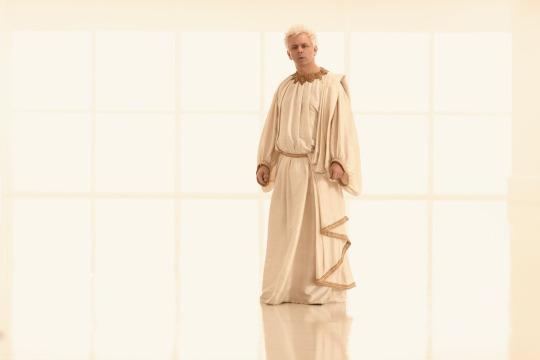
On a technical level, the biggest thing that stands out to me about this fabulous robe is the draping. Oh, the draping. It feels like a classic angel 'fit because on a very fundamental level, it is. A lot of what we think of as angelic draws on Renaissance artists' depictions, with flowing robes, fluffy wings, and glimmering halos. In art from this era, there is a strong attention to detail on the natural flow of fabrics that makes Renaissance sculpture so breathtaking, such as here: (The Ecstasy of St. Teresa, Bernini, 17th century CE)

It's this ability to make solid marble look like fine silk rippling with movement that leaves such a strong impression in my mind when I look at these kinds of works.
In painting, too, there is a similar effect. Something about the material culture of the Renaissance really lent itself to this style, perhaps fueled by the rise in new textile luxuries that occurred in vaguely the same period. This is seen especially strongly for angels, such as in the sculpture above, and in this painting: (The Annunciation to the Virgin, Botticelli, 15th century CE)
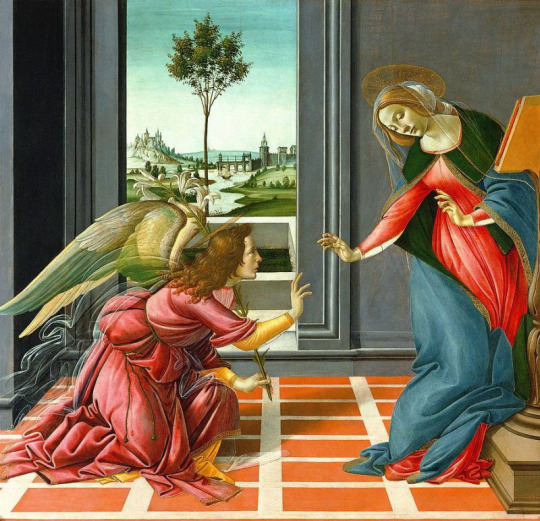
There's a stark contrast between the dress of the two figures. The virgin Mary is no less ornamentally or expensively dressed, but her style is rather minimalistic next to the angel's voluminous robing. It paints a very clear impression of angelic dress, and the designers for Good Omens would have been aware, in at least a small way, of the art history precedence for such a thing.
The poof of the sleeves, the tucks down the front, the little belt with the train tucked in, the gathers, the weight of the fabric, everything about this robe is constructed to carefully recreate the rather fantastical imagery of renaissance art. It's not necessarily an easy texture to nail down, given that the artists themselves had no concerns of gravity, comfort, or the way it would look in actual 3d motion, while our brave costumers were dealing with all three as well as a budget, time constraints, and the constant consideration that white fabric just gets dirty so easy.
Here's some of the other angels as well, so you can see how theirs reflect those same dramatic themes.

And then, of course, when costuming a show you have a second question: What does this mean for our character? Or rather, we know how, but WHY did they make him look so traditionally angelic?
Well, thematically, the Job minisode centers around Aziraphale's struggle with being a good angel and Crowley's struggle with being a good demon. Aziraphale is learning how to be an angel that follows along with heaven as far as we can, and he's so terribly torn up about it. He spends a lot of his time fretting about doing what's expected demanded of him, even if perhaps he doesn't believe it to be the right choice. Natural, then, that he should look the part of the perfect angel whilst sorting out these ethereal woes.
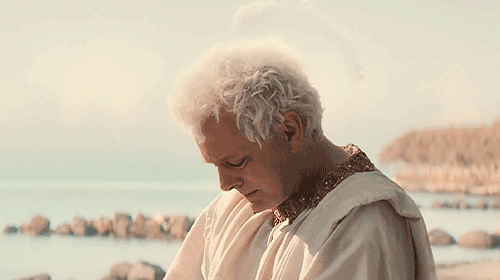
Crowley even draws attention to it himself, giggling a bit at the suggestion that Aziraphale, with his fluffy hair and flowing angelic garb, could possibly become a demon. And it is a rather silly mental image; the garment itself would be comically silly in really ANY other context at all. In the same manner, his performance of angelic archetype borders on excessive:
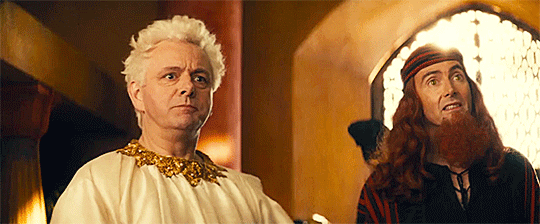
He's trying so desperately hard here to be the angel he wants to and is supposed to be. He's dressed the part, he's using his big scary angel voice, but deep down he's clinging to an identity that doesn't quite fit.
(You'll notice in this shot the distinct difference between his and Crowley's dress on the level of silhouette as well as color. We see this a lot from the two of them, but with the points I made above it felt worth pointing out in this particular scene)
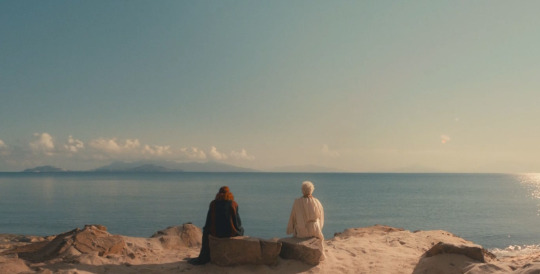
Here at the end, as he's coming to terms with the cracks in his heaven-given identity, his robe is largely in shadow, blurring out its startling whiteness. We do not see him dressed this way again. (He continues to wear white, obviously, but from here on out his style of dress mimics the human trends of the time rather than that classical angelic imagery)
#good omens analysis#art history#sometimes I am an academic weapon but only when it doesn't count#aziraphale good omens#job minisode#costume design#good omens#good omens costumes#aziraphale#michael sheen#historical clothing#good omens 2#neil gaiman#also I love the little human touch of that little bend in his fucking sleeve cuff when he says avaunt#like that's a fully real piece of clothing that he's wearing not something animated and sometimes you just have to sit and appreciate it#it just makes me laugh a little#I'm sure someone somewhere agonized over it and wishes they'd fixed it but it just feels so human to me
339 notes
·
View notes
Text
Aziraphale and Forgiveness, Pt. 2: The Source of Salvation
This series is now complete! Here's where you can find the other parts.
Part 1 here.
Part 3 here.
Part 4 here.
(This post ended up being way longer than I intended, oopsie! And no fun GIFs to break it up this time. Hope you like reading lots of words!)
So why would Aziraphale, an angel who has not fallen despite bending/breaking the rules many times, have so much emotional baggage around the topic of forgiveness?
Some disclaimers:
Disclaimer 1: I've seen enough of tumblr already to know that "does Aziraphale really have religious trauma?/how much does it motivate his actions?" is the subject of Discourse around these parts. I don't want to have that argument here. Aziraphale's experience with Heaven has strong parallels to my personal religious history, and those specific parallels are what I'm here to talk about.
Disclaimer 2: I am not a bible scholar or religious historian, if I mention specific church doctrines or bible verses it's only to illustrate the experience of growing up in my church. My actual biblical/theological accuracy may be sloppy.
Disclaimer 3: I haven't read Good Omens the book. I know there are differences, but I'm not addressing them. All my thoughts are about show!Aziraphale and show!Heaven only.
Okay. Here goes.
The next point I want to make is that Aziraphale has spent his life inside a system that has weaponized the concept of forgiveness. Because Heaven, in the Good Omens universe, operates a lot like a particular flavor of toxic Christianity that I happen to be very familiar with.
In the version of Christianity I was raised with:
Your only purpose is to serve God's will. Our own needs, wants, goals, etc, were all understood to be secondary to that purpose.
The specter of eternal punishment is always present. Like any self-respecting Evangelical church, we believed that if you weren't "saved" before you died, you would go to Hell and be punished forever. How do you make sure you're saved? Well...
The rules are not clear or consistent, so you're always left guessing. We were a Protestant denomination, so a foundational doctrine was "sola scriptura." (We weren't fancy enough for the Latin, though, we just called ourselves "bible-based.") The basic idea is that the bible is the word of God, it's infallible, and it's the only authority we need to follow. But the bible is a cobbling-together of texts written thousands of years ago, that have been translated multiple times. It's not self-evident to a modern reader what any given passage means. It contains internal contradictions all over the place. So...the bible is the only authority we need to follow, but it's confusing and needs interpretation. Enter pastors and other church leaders to help us interpret. Only...they each have their own pre-existing biases and preferred scholarly interpretations, so even within the same church, different pastors might have different ideas about things.
So, to summarize: Follow what the bible says! Don't understand what it's telling you? Ask your pastor! Different pastors give different answers? Ugh, you're thinking about this too hard. Go pray about it or something. Just figure it out.
New ideas and experiences are, at best, begrudgingly tolerated. Because doing God's will is your only purpose, remember? And the Bible (and your pastor) are the source of the only wisdom you need to fulfill the only purpose you have. So really, you don't need anything outside what the church has to offer you and it's all a distraction anyway. (...okay, if you really must, here's a watered-down, church-approved version of the thing, now shut up.)
This isn't just the church being a buzzkill. It keeps you dependent on them and ignorant of the outside world to whatever extent they monitor and censor outside influences. My church was not even that extreme about this, relatively speaking, but it was still enough to profoundly impact me and leave me confused and floundering in the larger world after I left.
No matter how hard you try to measure up, you're ultimately at God's mercy. So you spend your life trying to follow a bunch of confusing, opaque rules in the hopes that you can be "saved" and avoid eternal punishment. But here's kicker: none of it truly matters anyway, because we were also taught that everyone falls short in the end and that the only real salvation comes from God forgiving you for your sins. All you really have to do to be saved is accept his free gift of forgiveness...by...believing the right things in the right way and praying the right prayers about it. And then spending the rest of your life still trying to follow all the convoluted rules, because doing so is proof that you were sincere...in your acceptance of God's forgiveness...which you accepted by following even more instructions regarding what to believe and how to pray to ensure that you were accepting it correctly.
How do you know if you've done any of this right? You never can, truly, until you die and find out. Because God's not actually talking to anyone. So in the end, no matter what you do, you end up in the same place: at the mercy of God, who decides whether you're forgiven or not.
If you're thinking that sounds like an incredibly confusing and exhausting way to grow up, you are correct! It also has a lot of parallels in Good Omens.
If you are an angel working for Heaven in the world of Good Omens:
Your only purpose is to serve God's will. This one is obvious. If you're an angel, it's literally the only thing you were created for.
The specter of eternal punishment is always present. The eternal punishment that can happen to an angel is falling. We know it's a punishment, because we know Crowley's fall was painful and because we can see that Hell is a miserable environment for the demons. This isn't The Good Place, where demons gleefully sit around eating snacks in conference rooms and brainstorming new fun ways to torture humans. Hell in Good Omens sucks for everyone there. And we can assume falling is meant to be permanent, because if it wasn't Crowley and Aziraphale wouldn't have been so gobsmacked by the Metatron's offer to restore Crowley to angelic status. Because there's no precedent for that. Crowley himself says that being a demon has automatically rendered him unforgivable. As far as anyone in this universe knows, "fallen" is a permanent state.
So how does an angel avoid eternal punishment? How do angels make sure they don't fall? Well...
The rules are not clear or consistent, so you're always left guessing. Was falling a one-and-done mass exile of everyone who rebelled, right after the war? The way both Heaven and Hell talk about the fall and the "casting out" of the demons would seem to suggest so. But fear of falling is obviously ever-present among the angels, so they clearly don't know for sure one way or the other. And what would cause an angel who wasn't part of the original rebellion to fall? Aziraphale thought he would fall for lying about Job's children. The archangels threatened Aziraphale with falling for "consorting" with Crowley in S1. Gabriel expected to fall for saying no to Armageddon the Sequel in S2. But none of those falls actually happened. Clearly even the angels in the highest positions of authority don't know exactly what the rules are about falling. And who decides who falls? Gabriel says the demons were "cast out" after the war, but who did the casting out? Did God handle that directly? Was it the Metatron? Did the transformation just sort of...happen, leaving everyone unsure about the details? And what about present day? The Metatron said that Gabriel would have his memory wiped instead of falling, but does that mean the Metatron gets to decide if an angel falls, or was he covering for the fact that he doesn't know how it works either?
We, the viewers, don't know the answers to any of these questions. But it's fairly clear that the angels also don't know.
New ideas and experiences are, at best, begrudgingly tolerated. The angels know little to nothing about the world or humanity and are disdainful or outright suspicious of earthly experiences. In the case of the ones who have never been sent to Earth, this makes sense, although it begs the question of why there are so many angels who have never once been sent to Earth, the planet that is supposed to be central to the Great Plan.
It's obviously, at its core, about control and keeping the angels ignorant of anything that would broaden their perspective. But listen to how the angels themselves talk about it. When Gabriel sees Aziraphale eating sushi, he asks, "Why do you consume that? You're an angel." (Subtext: You don't need to eat, so what's the purpose of indulging in this experience?) When Aziraphale suggests he try the food himself, Gabriel starts talking about sullying the temple of his body or whatever. (Subtext: It's not technically forbidden but it would be a deviation from my function as an angel so I'm suspicious of it.) And look at Aziraphale himself. He lives on Earth for many hundreds of years before he can be persuaded to even try human food, and Crowley has to work at convincing him it's okay. He seems to know it's not forbidden but he's deeply distrustful of it anyway. (I have a theory that a holdover of this mindset is why he's so set in his ways, behind the times, and still more ignorant of humans that you'd expect in the present day, but this post is already too long.) The attitude cultivated among the angels is These things are not meant for us, we don't need them, and they are a distraction from our higher purpose, so it's better if we don't.
No matter how hard you try to measure up, you're ultimately at God's mercy. So, if you're an angel, you're meant to be doing God's will, and if you fail badly enough you can be punished forever by falling. But the rules are unclear, the way falling works is unclear, in most cases you're kept ignorant of everything but the bare minimum you need to know to do your job, God isn't talking to anyone, and the (seemingly) officially appointed Voice of God is also pretty remote and mysterious most of the time.
So the only time you'll ever know for certain that you've crossed the line is once you've already crossed it, when it's too late to do anything about it. At that point, the only thing that could save you from falling would be if God just...decided to be merciful, to grant you a pardon (i.e. to forgive you) and not do the casting out thing.
Believe it or not, I had to work really hard to keep this as short as it is. If you've read this far, I salute you. Now, what's the point?
Aziraphale and the other angels are part of a system where they understand very little, they have no real power, the stakes are eternal, and their only hope of escaping endless punishment if they fail is the possibility that God will decide to show mercy and forgive them.
Yes, in the real world this is all just bullshit spread by religious leaders to scare and confuse and manipulate people into compliance and in the world of Good Omens it's actually real. But the emotional impact of feeling that confused and powerless and at the mercy of a higher authority is going to be the same. Of course Aziraphale has some Big Feelings about the subject of forgiveness. Of course it's one of his favorite things. It's not just a nice thing you do for people. It's powerful enough to rescue someone from eternal punishment when nothing else can. Powerful enough to wield as a devastating weapon by withholding it. It's a tool of control in Heaven, but it's also the source of salvation.
I was going to segue from here into what I think the specifics of Aziraphale's mindset are, but it took me so many more words than I expected just to lay out the parallels between GO Heaven and (my experience of) real-world toxic Christianity so I'm gonna stop here. Next time I'm going to dig into what I think is happening in Aziraphale's head when he forgives Crowley, and also when he does things like shelter Jimbriel (a very forgiving action, even if the words "I forgive you" don't accompany it).
#good omens#good omens meta#good omens 2 spoilers#character analysis#aziraphale#religious indoctrination#religious trauma#forgiveness#i forgive you#i'm very normal about this#this post is so long i apologize
181 notes
·
View notes
Text
celestial surveillance + some garden of eden parallels
For there is nothing hidden that will not be disclosed, and nothing concealed that will not be known or brought out into the open. - Luke 8:17 (NIV)
Over and over, we see how the bookshop feels safe/private while simultaneously being sort of a fishbowl, leaving its inhabitants quite exposed to onlookers. *garden of eden vibes*

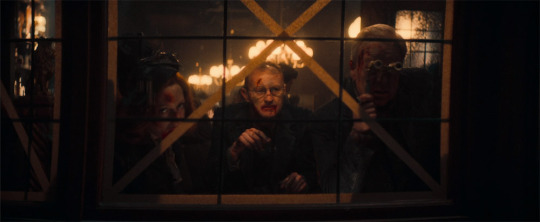
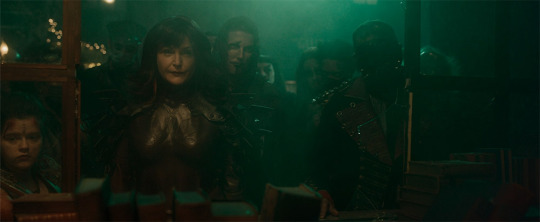
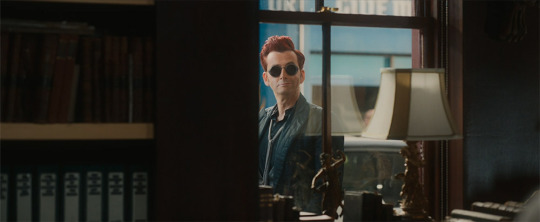

Similarly, Aziraphale and Crowley tried to conduct a class-A surreptitious 6000+ year agreement/slowburn romance and yet their 25 Lazarii relationship is fairly obvious to others.
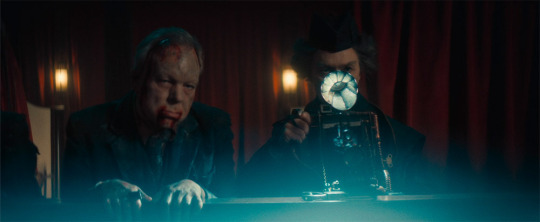

Reminiscent of how Crowley is painfully aware that nothing is certain and time is horribly finite, Aziraphale lives with the knowledge that anything he does or says can be used against him—or much worse, used against Crowley or others our little guardian cares about. Unlike his emotional support demon, however, Aziraphale was afraid Before the Beginning, before The Fall.
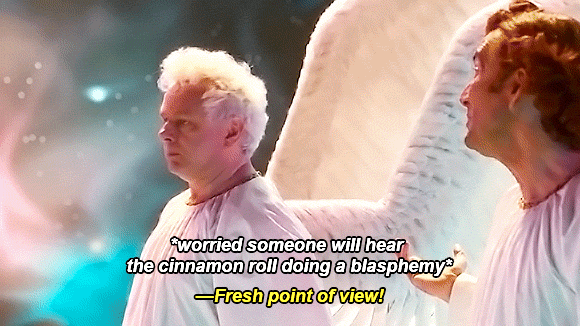
While Upstairs aren't the only ones watching, they have the potential to be the most dangerous threat (emphasis on potential bc they have to take an interest and also maybe stumble into important clues): The heavenly office overlooks the entire world. Where Hell had to send Furfur to the theatre with a camera, Heaven's got Earth Observation Files they can pull up to see what someone was doing at any point in history—not even St. James Park can keep you anonymous in the face of thirty-seven classes of scriveners/recording angels!
Aziraphale may tend to underestimate danger in general because of his misplaced hope that Heaven is truly Good, but in the same way that he can be both clever and stupid, I think he trusts Heaven and fears it at the same time. Why else would he be so worried about breaking their rules even when he knows they are wrong?


Of course, Aziraphale is also a courageous little bastard with a deity-defying protective streak! Despite Heaven's indoctrination, we see him navigating all sorts of grey area as he learns to 'blur the edges'. But he knows it isn’t safe to do that openly. He keeps this more human side hidden and tries not to think too hard about why doing good is wrong in heavens eyes. (lol other people's aziraphale metas are my main food group rn)
At the end of S2, we see him leave A.Z. Garden & Co. after tasting the forbidden fruit large oat milk latte, armed with his naïve/misguided 'knowledge of Good and Evil'. (and perhaps he knows he can't 'let the sun can’t go down' on him in Soho lest the the Metatron mete out death instead of coffees?) When Adam and Eve left Eden, Aziraphale and Crowley observed from above. When the angel and demon leave their own garden, we get the sense that they are also being watched.
(also idk if this is anything but Adam facing off against the lion while Eve looks on in the bg seemed a bit like Crowley watching Aziraphale walk into danger w the Metatron. could be a good sign since the lion gets turned into salami)
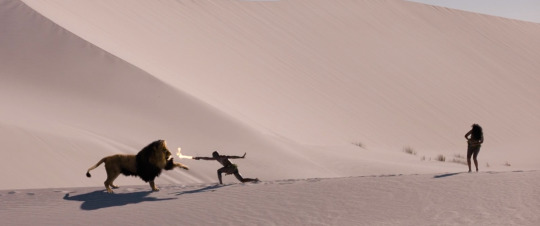
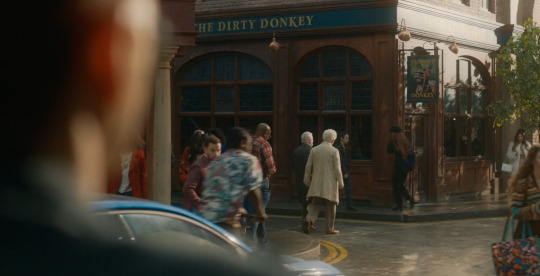
There are hints at the end of S2 that the watching is getting a little a spicier (at least I think they are hints haha): the bookshop windows are still broken during the last part of E6, further decreasing privacy; the zombies used binoculars to watch A&C from the Dirty Donkey under cover of darkness in 1941 but the Metatron just looks across the road in the light of day. And then there's the whole 'hefty jigger of almond syrup'.
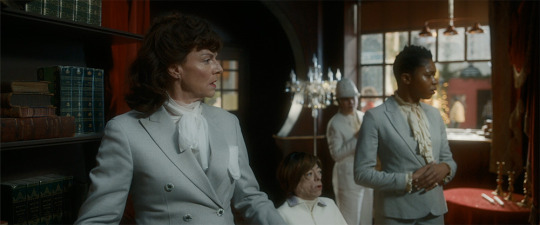


#im watching you wazowski always watching#also i'm just thinking jigger -> jiggery-pokery = trickery?? that's got to be on purpose right? *admiral ackbar voice* ITS A TRAP#good omens meta#good omens analysis#the metatron#a.z.fell & co.#the garden of eden#good omens#good omens 2#good omens s2e6#the final fifteen#aziraphale#crowley#lol this started as a paragraph in the GO:Lockdown Aziraphale draft but it was getting too big so here we are#i'll finish it eventually but i just like looking at everything everyone else is posting sm and i get distracted#a.z. fell and co.
252 notes
·
View notes